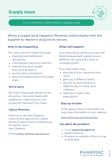Methylphenidate
This information is intended for use ONLY after you have been prescribed methylphenidate.
Key points about methylphenidate
- Methylphenidate is used to treat attention deficit hyperactivity disorder (ADHD).
- It belongs to a group of medicines known as stimulants.
- Methylphenidate is also called Ritalin, Concerta or Rubifen.
- Find out how to take it safely and possible side effects.

Methylphenidate is used to treat attention deficit hyperactivity disorder (ADHD) in adults and children. It can help you to concentrate better, be less impulsive, and feel calmer.
- It's not known exactly how methylphenidate works. It's thought to boost the levels of chemicals called dopamine and noradrenaline in the brain.
- This can increase activity in the parts of the brain that control attention and behaviour, to reduce hyperactivity or impulsivity and improve concentration.
- Medication is just one part of treatment for ADHD. It's used to support other changes to your lifestyle and behaviour. Read more about ADHD in adults and ADHD in children.
Methylphenidate is also used to treat narcolepsy, a sleep disorder.
Methylphenidate comes in different strengths and forms
The different forms work differently in how they release the medicine into the body, and this can affect how they work to manage ADHD symptoms. Some types of methylphenidate are standard (immediate release) tablets and others are slow release (also called extended, sustained or modified release) tablets and capsules.
- Immediate release tablets: Examples are Rubifen (5 mg, 10 mg, 20 mg) or Ritalin 10 mg. Although standard tablets are sometimes called immediate release, they can still take a few hours to start working. Their effect lasts about 4 hours.
- Sustained release tablets: An example is Rubifen SR 20 mg. They gradually release the medicine over the day and their effect lasts about 8 hours.
- Extended release tablets: Examples are Concerta or Methylphenidate ER – Teva. They come as 18 mg, 27 mg, 36 mg and 54 mg tablets. They gradually release the medicine over the day and their effect lasts about 12 hours.
- Modified release capsules: An example is Ritalin LA (10 mg, 20 mg, 30 mg, 40 mg). The modified-release capsules contain both immediate-release and slow release methylphenidate, and different strengths have different amounts of each. They start to work with a first release of the medicine into the body. After that, the medicine continues to release into the body more slowly and lasts for about 8 hours.
Always follow the advice of your doctor and the instructions that come with the medicine. Different brands of methylphenidate tablets and capsules may have different instructions.
|
August 2024: There's a New Zealand-wide shortage of the Concerta and Teva extended-release (ER) methylphenidate brands. Concerta and Teva ER come as 18 mg, 27 mg, 36 mg and 54 mg tablets. All strengths may be affected by the supply issue, which is expected to last until the middle of next year (2025). Some people may not be able to get a supply of their usual strength of tablet. At times, neither brand may be available and you may be switched to another type of methylphenidate. What should I do if I'm taking Concerta or Teva ER? ✔ Before getting your next prescription, contact your usual pharmacy to see which forms are available, or when supplies are expected. ✔ If you are affected by this supply issue, see your doctor to discuss whether you should be prescribed a different form of methylphenidate. ✔ If you are prescribed a different form of methylphenidate, make sure you know how to take it. Different brands of methylphenidate tablets and capsules may have different instructions. ✔ Always follow the advice of your doctor and the instructions that come with the medicine. ✔ Your doctor may discuss a treatment break with you. (See below: How long will I (or my child) take methylphenidate for?) Learn more about the Methylphenidate ER tablets (Concerta and Teva) supply issue.(external link) |
In Aotearoa New Zealand methylphenidate is funded under a Special Authority, for people who meet the criteria. A special authority means your specialist will need to make an application to Pharmac (the government medicine funding agency) for approval before the medicine can be funded for you.
- From December 2024 Pharmac has removed the special authority renewal requirements for methylphenidate. This means that once special authority approval has been granted, it won't need to be renewed. Your doctor or nurse practitioner can continue to prescribe it.
- Previously, people needed input from a specialist every 2 years to renew their special authority. Children (under 5 years of age) needed renewal every year.
- Read more about the removal of the renewal criteria for stimulant treatments(external link).
- Methylphenidate is available in several forms. Check with your pharmacist which form you are taking.
- The dose of methylphenidate will be different for different people, depending on the brand you are taking and your response to the medication.
- Always follow the advice of your doctor and the instructions that come with the medicine. Different brands of methylphenidate tablets and capsules may have different instructions.
Always follow the advice of your doctor and the instructions that come with the medicine. Different brands of methylphenidate tablets and capsules may have different instructions. Here is some guidance.
Rubifen (5 mg, 10 mg, 20 mg), Rubifen SR (20 mg) or Ritalin (10 mg) tablets
- These are usually given 2 or 3 times each day.
- This should be in the morning, then around midday and, if necessary, late afternoon. Ideally, these times are about 4 hours apart.
- If you have problems sleeping, take the last dose at least 6 hours before bedtime.
- Swallow the tablets with a glass of water, milk or juice.
- Some tablets can be crushed and mixed with a small amount of soft food such as yogurt, honey or jam. Ask your pharmacist if this is possible with your tablets before doing this.
- If you forget to take your dose, take it as soon as you remember. But if it's nearly time for your next dose, just take the next dose at the right time. Don't take double the dose.
Concerta®, Teva® or Ritalin LA®
- These are usually given once each day, usually in the morning.
- Swallow the tablets or capsules whole, with a glass of water. Don't crush or chew them, as they won't work properly.
- The Ritalin LA capsule can be opened and the contents mixed with a small amount of soft food such as yogurt, honey, jam, or cold apple sauce. Swallow the mixture straight away, without chewing.
- If you forget to take your dose, take it as soon as you remember. But if it's nearly time for your next dose, just take the next dose at the right time. Don't take double the dose.
Here are some things to know when you're taking methylphenidate. Other things may be important as well, so ask your healthcare provider what you should know about.
- If you're taking the Concerta brand of methylphenidate, you may notice the tablet shell in your poo. This is normal because the shell of the tablets don't dissolve completely in your gut, but the medicine is still absorbed by your body.
- Limit or avoid drinking alcohol while you're taking methylphenidate: Alcohol can make the effects of methylphenidate greater and it can make the side effects worse.
- Be careful when driving or using tools until you know how this medicine affects you: Methylphenidate may give you blurred vision, make you feel dizzy, or affect your focus when you start taking it.
- Taking other medicines: Methylphenidate interacts with some medicines, herbal supplements and rongoā Māori, so check with your doctor or pharmacist before starting methylphenidate and before starting any new products.
You may need to take methylphenidate for several months or even years, but it's unlikely that you'll need to take it for the rest of your life.
Regular check-ups: You'll have regular check-ups, usually every 6 months or so, to see how well the medicine is working and if any changes are needed.
Medicine holiday: Your doctor may recommend stopping methylphenidate for a while, or reducing the dose. For children, this will normally be during the school holidays and can be called “a medicine break”. This is to check whether it’s still helping.
Teenage reassessment: As your child gets to puberty, or just after, they will be assessed to see if the medicine is still needed, The doctor may stop their methylphenidate. But if the medicine is still helping, they may recommend that your child keeps taking it, even as an adult.
Don't stop methylphenidate suddenly: Talk to your doctor first, it might be best to reduce the dose gradually. This reduces the risk of having extra side effects when you stop taking this medicine.
Like all medicines, methylphenidate can cause unwanted side effects, although not everyone gets them. Often unwanted side effects improve as your body gets used to the new medicine.
| Side effects | What should I do? |
|---|---|
|
|
|
|
|
|
|
|
Read more about medicines and side effects and reporting a reaction you think might be a side effect.
The following links provide further information on methylphenidate:
Medsafe Consumer Information Sheets:
Concerta(external link)
Ritalin(external link)
Rubifen(external link)
Brochures
Methylphenidate for ADHD(external link) New Zealand Formulary for Children
Supply issue(external link) Pharmac, NZ, 2025
Medicines and side effects(external link) Healthify He Puna Waiora, NZ, 2024
5 questions to ask about your medications(external link) Health Quality and Safety Commission, NZ English(external link), te reo Māori(external link)
Learn more
Methylphenidate extended release (12-hour) tablet formulation shortage update and advice(external link) Pharmac, September 2024
Brochures

Medicines and side effects
Healthify He Puna Waiora, NZ, 2024

Supply issue
Pharmac, NZ, 2025

Health Quality and Safety Commission, NZ, 2019 English, te reo Māori
Credits: Sandra Ponen, Pharmacist, Healthify He Puna Waiora. Healthify is brought to you by Health Navigator Charitable Trust.
Reviewed by: Angela Lambie, Pharmacist, Auckland; Sara Ammar, Senior Pharmacist Mental Health, Te Toka Tumai Auckland
Last reviewed:
Page last updated:





